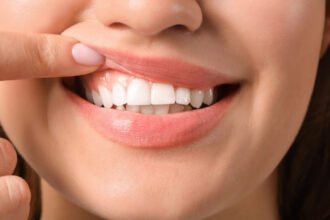Your dental health is one to be taken as seriously as other health aspects of your life. A dental issue can lead to low quality of life, and sometimes, extend beyond your teeth. A regular dental check-up and examination with a dentist will keep you abreast of any dental situation that may pop up. Visiting a Specialist Dentist will ensure that your teeth are in excellent shape.
Generally, it’s advised that you visit a dentist at least once every six months. However, your frequency of visits to a dentist may be more than that if you have some dental issues. These visits allow your dentist to check for any possible dental issues and proffer solutions as fast as possible.
In this piece, you’ll understand the importance of regular visits to your dentist. You’ll also know how often you should go to the dentist.
Why you should see a Richmond dentist regularly
Your teeth aren’t normally one of the body organs you’re concerned about, and that’s because it’s naturally hard and somewhat resistant to wear. Although they can and will if not properly cared for. You may practice good dental hygiene but there’s always a chance that your dentition will experience a problem, either through your teeth or your gum.
The purpose of visiting a dentist, and regularly, is to prevent or treat some dental problems. Some of the dental problems you may experience, and a dentist will discover faster, include:
Chipped tooth
A chipped tooth may not cause any form of discomfort, but it throws off the total appearance of your dentition. Accidents such as falls or knocks can cause you to have a chipped tooth, and it can also lead to other serious problems with your teeth.
If you feel a sensation, if you suck in air, beneath a chipped tooth, chances are the nerves beneath the tooth are exposed, and that can cause tooth sensitivity with time.
Your dentist will help with the appropriate treatment regardless of the extent of damage your tooth has. Usually, the treatment ranges from using a crown or a strong resin material to cover or bond the chipped tooth. In serious cases where the pulp is at risk, root canal, veneer, and crown are the order of treatment.
Cracked teeth
Grounding teeth, chewing hard substances, or instantaneous hard collision of the upper and lower teeth can cause cracks in your molars. A crack in the teeth can be minimal or serious, depending on the force of contact.
A visit to your dentist will help them to know how serious your tooth cracks are, and if you’ll need a tooth pull or crown. Untreated cracked teeth may cause tooth sensitivity if you continue using them without treatment.
Tooth Sensitivity
A sharp sensation through your teeth and gum in reaction to cold or hot food is tooth sensitivity. It can be localized to a tooth or a set of teeth. This situation can be so serious that it keeps you off cold or hot foods and drinks, limiting the nutrition of your body.
The sensation occurs as a result of exposed pulp and nerves, and teeth cracks, cavities, gum diseases, or exposed roots can be the cause.
A dental examination by your dentist will point out the source of the problem and proffer the best solution so that you can return to normal dental health.
Hyperdontia
Hyperdontia is a condition where a person has more than the normal number of teeth in their mouth. Some of the teeth may be ingrown and cause pain to the individual, hence the attention of a dentist.
Apart from pain, hyperdontia causes crooked teeth arrangement and can create areas for bacteria to hide in your teeth, which may cause tooth decay and cavities.
A dentist can help you remove the excess teeth if it’s causing discomfort or exposes you to other forms of dental issues. Subsequent visits will help the dentist keep watch on the health of your teeth.
Cavities
Cavities are the holes that appear on the enamel. They begin as a stain on the teeth, usually as a result of protracted bacterial presence. The bacteria breaks down the enamel and gains entry into the teeth, causing symptoms such as toothache and sensitivity.
Depending on where the cavities are found, they can cause serious dental issues, including gingivitis. An examination by a dentist will determine the extent of damage the cavities have done, and the appropriate treatment applied.
In most cases, teeth filling is the treatment. However, continuous dental hygiene is recommended to prevent a recurrence.
Gingivitis
Gingivitis is a disease of the gum that starts with a bacterial build-up called plaque. The continuous buildup of this bacteria weakens the gum tissues and penetrates the teeth to their roots.
The common symptoms of gingivitis include tender and bleeding gum, loose teeth, and toothache.
A regular visit to a dentist will help you prevent extreme results of gingivitis, such as losing your teeth, difficulty chewing or speaking, and bone loss in the jaws.
Stained teeth
As one of the common dental problems people struggle with, stained teeth affect the self-esteem of some people as they feel the color of their teeth isn’t right. In some cases, they’re right, especially if they’d previously had a cleaner and brighter dentition. However, some people have yellow teeth, naturally.
Whichever group you fall under, you can have the right dental recommendations and treatment from a dentist. Your original teeth’ color will be restored after treatment, and you’ll get recommendations to maintain it.
How Many Times Should You Go to the Dentist?
Your frequency of visits to the dentist should be no less than twice in 12 months. Spaced well, this will mean one dentist visit in 6 months. However, if you have a dental issue, your visit should be more frequent.
Your dentist will recommend how many times you need to come in for examination depending on the seriousness of your dental condition. A patient with gingivitis needs more attention than one with a chipped tooth. However, no matter how healthy you feel your teeth and gum are, you should see a dentist twice a year to avoid dental problems.
Things to Consider
Your dental health is as important as any other health-related aspect of your life. Your teeth come in constant contact with bacteria and sugar, hence the need to always practice good dental hygiene, and see a dentist in Richmond regularly.
It’s recommended that you see a dentist twice in 12 months if you have a healthy dentition. However, if you have a dental issue, a more frequent visit, as recommended by your dentist will help you.









